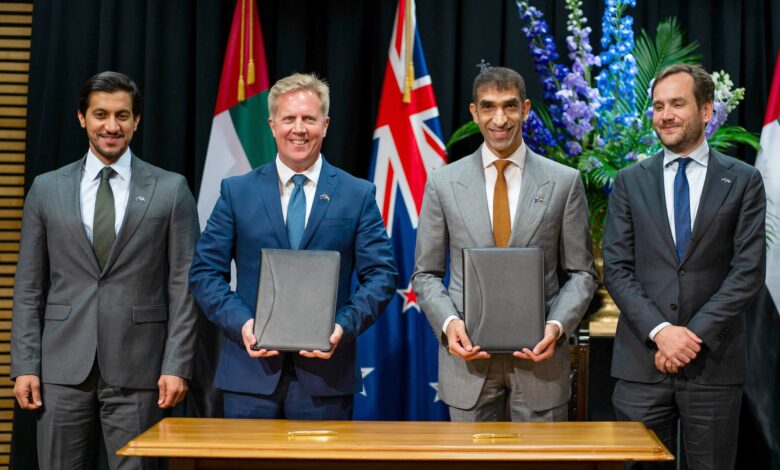
UAE and New Zealand Finalize Terms of Trade Agreement
The United Arab Emirates (UAE) and New Zealand have reached a milestone in their diplomatic and economic relations. The two nations have finalized a Comprehensive Economic Partnership Agreement (CEPA), marking a significant step in their future-focused diplomacy. This agreement is poised to have an impact on regional prosperity and strengthen economic ties between the UAE and New Zealand, opening up new avenues for trade and investment.
The UAE-NZ CEPA is set to create opportunities for economic deals across various sectors, including technological cooperation and infrastructure investment. This partnership aims to boost bilateral trade, encourage innovation, and foster sustainable growth for both countries. As the agreement unfolds, it is expected to bring about positive changes in the economic landscape of the UAE and New Zealand, paving the way for enhanced collaboration and mutual benefits in the years to come.
Key Elements of the UAE-NZ CEPA
The Comprehensive Economic Partnership Agreement (CEPA) between the UAE and New Zealand encompasses several key elements that aim to boost trade, investment, and cooperation between the two nations. This agreement reflects the UAE’s commitment to future-focused diplomacy and its efforts to enhance regional prosperity through strategic economic partnerships.
Tariff Elimination
A cornerstone of the CEPA is the significant reduction in trade barriers. Upon entry into force, the agreement will eliminate duties on 98.5% of New Zealand’s exports to the UAE, with this figure rising to 99% within three years. This move is set to have a substantial impact on various sectors, particularly agriculture. For instance, the UAE will remove all tariffs on frozen beef and sheepmeat from New Zealand immediately, while chilled products are already tariff-free. This elimination of the current 5% tariff on frozen meat products is expected to save the sector approximately AED 2,754,097.79 annually, based on 2023 figures.
Services and Investment
The CEPA extends beyond goods to include services and investment, creating new opportunities for economic deals and technological cooperation. The agreement provides greater certainty for New Zealand services exporters operating in the UAE, benefiting sectors such as professional services, education, audio-visual and gaming, engineering, and environmental services. To facilitate investment, the CEPA includes an Investment Facilitation chapter and a separate Bilateral Investment Treaty. These provisions aim to create a framework for broadening and strengthening the investment relationship between the UAE and New Zealand, encouraging greater two-way investment flows.
Sustainable Development
Recognizing the importance of sustainable growth, the CEPA incorporates chapters on sustainable development, labor, sustainable agriculture, and climate. This aligns with the UAE’s strong interest in environmental sustainability and provides a platform for New Zealand to showcase its environmental credentials. The agreement also includes provisions on indigenous trade and intellectual property, demonstrating a commitment to inclusive economic growth. Additionally, the trade and sustainable development chapter acknowledges the significance of the International Labor Organization’s Constitution and Declaration on Fundamental Principles and Rights at Work, ensuring that economic progress is balanced with social responsibility.
Economic Impact and Trade Opportunities
The UAE-NZ Comprehensive Economic Partnership Agreement (CEPA) is set to have a significant impact on the economic landscapes of both nations, opening up new avenues for trade and investment. This agreement aligns with the UAE’s future-focused diplomacy and its commitment to enhancing regional prosperity through strategic economic partnerships.
Boost to Bilateral Trade
The CEPA is expected to have a substantial influence on bilateral trade between the UAE and New Zealand. Upon entry into force, the agreement will eliminate duties on 98.5% of New Zealand’s exports to the UAE, with this figure rising to 99% within three years. This move is poised to create new opportunities for New Zealand businesses in the dynamic UAE market, contributing to the ambitious target of doubling exports by value in ten years.
In the year to June 2024, two-way trade between the UAE and New Zealand was valued at AED 4.77 billion. The UAE has established itself as one of New Zealand’s largest markets in the Middle East and a top 20 export market overall. Key export sectors from New Zealand to the UAE include dairy (AED 2636.59 million), industrial products (AED 870.29 million), red meat (AED 168.92 million), horticulture (AED 161.57 million), and tourism (AED 113.84 million).
Sector-Specific Benefits
The CEPA is set to bring about benefits across various sectors, fostering economic deals and technological cooperation. For the agricultural sector, the agreement offers new opportunities in a world increasingly marked by protectionism. The UAE will remove all tariffs on frozen beef and sheepmeat from New Zealand immediately, while chilled products are already tariff-free.
Professional services, education services, and the audio-visual and gaming sectors, as well as engineering and environmental services, are all expected to benefit from this agreement. The CEPA’s strong commitments on services, government procurement, and investment are likely to create a framework for broadening and strengthening the investment relationship between the UAE and New Zealand.
Strategic Significance of the Agreement
The UAE-New Zealand Comprehensive Economic Partnership Agreement (CEPA) holds substantial strategic importance for both nations, extending beyond mere economic benefits. This agreement aligns with the UAE’s future-focused diplomacy and its commitment to enhancing regional prosperity through strategic economic partnerships.
Regional Hub Access
The CEPA positions the UAE as a vital logistics hub and gateway for New Zealand companies into the wider Middle East and North Africa (MENA) region. As New Zealand’s largest trading partner in the Middle East, accounting for 50 percent of its trade with the MENA region, the UAE serves as a crucial entry point for New Zealand’s exports. This agreement has an impact on New Zealand’s access to the dynamic and growing markets of the Gulf Cooperation Council (GCC) and beyond.
Furthermore, the partnership has the potential to boost cooperation in key sectors such as agriculture, sustainable energy, and the aviation and maritime industries. By leveraging the UAE’s strategic location and advanced infrastructure, New Zealand businesses can expand their reach and tap into new markets across the region.
Geopolitical Implications
The swift conclusion of this high-quality agreement reflects both nations’ commitment to strengthening international connections through trade. In an era marked by global economic uncertainties, this partnership underscores the importance of championing global connections and benefiting from the free flow of goods, services, capital, and ideas.
The CEPA has an influence on the geopolitical landscape by fostering closer ties between the UAE and the Asia-Pacific region. As stated by UAE Minister of State for Foreign Trade, Dr. Thani Al Zeyoudi, the agreement serves as a catalyst not only for bilateral trade but also for greater exchange between the UAE and the high-growth Asia-Pacific region. This strategic alignment has the potential to create new opportunities for economic deals and technological cooperation, further solidifying the UAE’s position as a global trade hub.
Moreover, the agreement has an impact on ongoing negotiations between New Zealand and the Gulf Cooperation Council (GCC). The successful conclusion of the UAE-NZ CEPA is expected to accelerate the broader GCC deal, potentially opening up even more significant trade and investment opportunities for both parties in the future.
The UAE-New Zealand Comprehensive Economic Partnership Agreement marks a significant step in strengthening economic ties between the two nations. This agreement has an influence on various sectors, including agriculture, professional services, and education, by eliminating tariffs and creating new opportunities for trade and investment. The CEPA also reflects a commitment to sustainable development and inclusive economic growth, incorporating provisions on labor rights, environmental protection, and indigenous trade.
Looking ahead, this partnership is poised to boost bilateral trade and foster closer regional ties. By positioning the UAE as a crucial gateway for New Zealand companies into the wider Middle East and North Africa region, the agreement opens up new avenues to expand market reach. What’s more, the successful conclusion of this deal could speed up ongoing negotiations between New Zealand and the Gulf Cooperation Council, potentially leading to even more significant trade opportunities in the future.
FAQs
What advantages does the Comprehensive Economic Partnership Agreement (CEPA) offer to the UAE?
The CEPA provides several benefits, including the elimination or reduction of customs duties and tariffs, the removal of technical barriers to trade, enhanced market access for UAE exporters, and accelerated investment into priority sectors.
Which countries are currently negotiating Free Trade Agreements (FTAs) with the UAE?
The UAE is in active negotiations for FTAs with various countries and trade groups, such as the European Union, Japan, China, Korea, Australia, Pakistan, India, Turkey, and the Mercosur countries, including Argentina, Brazil, Paraguay, and Uruguay.
Can you explain the significance of the Regional Comprehensive Economic Partnership (RCEP) for New Zealand?
The RCEP is vital for New Zealand as it strengthens trade and economic ties within the Indo-Pacific region, which is a crucial component of New Zealand’s Trade Recovery Strategy. This agreement is designed to position New Zealand favorably for recovery from COVID-19 impacts and to capitalize on new export and investment opportunities.
How many Comprehensive Economic Partnership Agreements (CEPAs) has the UAE signed?
Since signing its first CEPA with India in 2022, the UAE has successfully concluded and implemented a total of five CEPAs. Following the initial agreement with India, the second CEPA was signed with Israel and came into effect on April 1, 2023.







[…] Xi Jinping leads a historically closed economy and has emerged as an unexpected champion of free trade. The United States has moved toward protectionism. This fundamental change […]